|
|
|
Sort Order |
|
|
|
Items / Page
|
|
|
|
|
|
|
| Srl | Item |
| 1 |
ID:
183652
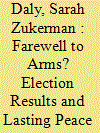

|
|
|
|
|
| Summary/Abstract |
Why does fighting recur after some civil conflicts, whereas peace consolidates following others? The untested conventional wisdom is that—absent safeguards—postwar elections are dangerous for peace because electoral losers will reject the election results and remilitarize. New cross-national data on postwar election results and belligerent-level data on remilitarization contest this view. Citizens tend to elect peace because they engage in “security voting”; they elect the party that they deem best able to secure the state, using the war outcome as the heuristic that guides their security vote. Findings indicate that the chance of renewed war increases if there is an inversion in the military balance of power after war, and the war-loser performs poorly in the elections. If, instead, relative military power remains stable, or citizens accurately update their understandings of the postwar power balance, a civil war actor is unlikely to remilitarize if it loses the election. Knowing when and how these belligerent electoral actors choose to either sustain or break the peace informs important theoretical and policy debates on how to harness democracy's benefits while mitigating its risks.
|
|
|
|
|
|
|
|
|
|
|
|
|
|
|
|
| 2 |
ID:
113941
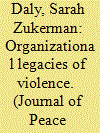

|
|
|
|
|
| Publication |
2012.
|
| Summary/Abstract |
Why do insurgencies erupt in some places and not in others? This article exploits an original violent event database of 274,428 municipality-month observations in Colombia to determine the conditions favoring organized violence at the subnational level. The data cast doubt on the conventional correlates of war: poverty, rough terrain, lootable natural resources, and large, sparsely distributed populations. The evidence suggests that rebellions begin not in localities that afford sanctuaries, impoverished recruits, and abundant finances, but instead in regions providing receptacles of collective action: the organizational legacies of war. Specifically, the data indicate that regions affected by past mobilization are six times more likely to experience rebellion than those without a tradition of armed organized action. The significant correlation between prior and future mobilization is robust across different measurements of the concepts, levels of aggregations of the data, units of analysis, and specifications of the model. These include rare events and spatial lag analyses. These results highlight the need for micro conflict data, theory disentangling the causes of war onset from those of war recurrence, and a reorientation away from physical geography and back to the human and social geography that determines if rebellion is organizationally feasible. The findings suggest new avenues of research on the post-war trajectories of armed organizations, the causes of repeated war, and the micro-foundations of rebellion.
|
|
|
|
|
|
|
|
|
|
|
|
|
|
|
|
| 3 |
ID:
180203
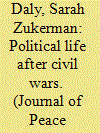

|
|
|
|
|
| Summary/Abstract |
Around the world, following civil wars, rebel and government belligerents contest and win the founding postwar elections. Despite the prevalence of these elections and their importance in setting post-conflict environments on specific political trajectories, their outcomes have been understudied. Existing scholarship centers on the timing and institutions of the postwar elections, but not on their party and voter participants. This article introduces a dataset which traces the postwar political trajectories of civil war belligerents, identifies their successor parties, charts their electoral performance, and documents their decision to remilitarize or demilitarize. The Civil War Successor Party (CWSP) dataset covers all belligerents that have transitioned from civil conflict in the period 1970–2015. The article describes the contours of the dataset, reveals patterns of political life after wars, and outlines the potential uses of the dataset for future research. In particular, it suggests how the data may be leveraged by scholars and practitioners to understand dynamics of political behavior, patterns of governance and public goods provision, quality of democracy, and recurrence of low- and high-intensity war in the aftermath of mass violence.
|
|
|
|
|
|
|
|
|
|
|
|
|
|
|
|
| 4 |
ID:
169492
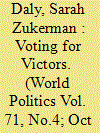

|
|
|
|
|
| Summary/Abstract |
Why do citizens elect political actors who have perpetrated violence against the civilian population? Despite their use of atrocities, political parties with deep roots in the belligerent organizations of the past win postwar democratic elections in countries around the world. This article uses new, cross-national data on postwar elections globally between 1970 and 2010, as well as voting, survey, archival, and interview data from El Salvador. It finds that belligerents’ varied electoral success after wars can be explained not by their wartime levels of violence or use of electoral coercion, but by the distribution of military power at the end of conflict. It argues that militarily stronger belligerents are able to claim credit for peace, which translates into a reputation for competence on the provision of security. This enables them to own the security valence issue, which tends to crosscut cleavages, and to appeal to swing voters. The stronger belligerents’ provision of security serves to offset and justify their use of atrocities, rendering their election rational. This article sheds light on political life after episodes of violence. It also contributes to understanding security voting and offers insights into why people vote in seemingly counterintuitive ways.
|
|
|
|
|
|
|
|
|
|
|
|
|
|
|
|
| 5 |
ID:
173210
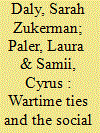

|
|
|
|
|
| Summary/Abstract |
While ex-combatant reintegration is vital to successful transitions from war to peace, some former fighters turn to crime following demobilization. Such criminality undermines the consolidation of political order. Leading theories of crime participation emphasize the role of both individual economic opportunities and factors related to social ties. Yet, we still know little about the social logic of ex-combatant criminality and how social and economic factors relate as drivers of crime participation. This article presents a theory of how wartime social ties – namely, vertical ties to former commanders and horizontal ties to ex-combatant peers – influence ex-combatant crime on their own and via their relationship to economic opportunity costs. We use the theory to derive predictions in the context of Colombia, and then test them with a combination of administrative data and high-quality original survey data. We find that both vertical and horizontal wartime ties are powerful drivers of ex-combatant criminality. Our evidence indicates that wartime ties mitigate the risks of criminal behavior by facilitating the transmission of criminal capabilities and pro-crime social norms. We do not find that economic conditions moderate the effect of wartime times nor do we find any indication that economic opportunity costs, on their own, predict criminality. These findings underscore the importance of wartime ties – both vertical and horizontal – to understanding post-conflict transitions and designing reintegration interventions.
|
|
|
|
|
|
|
|
|
|
|
|
|
|
|
|
|
|
|
|
|